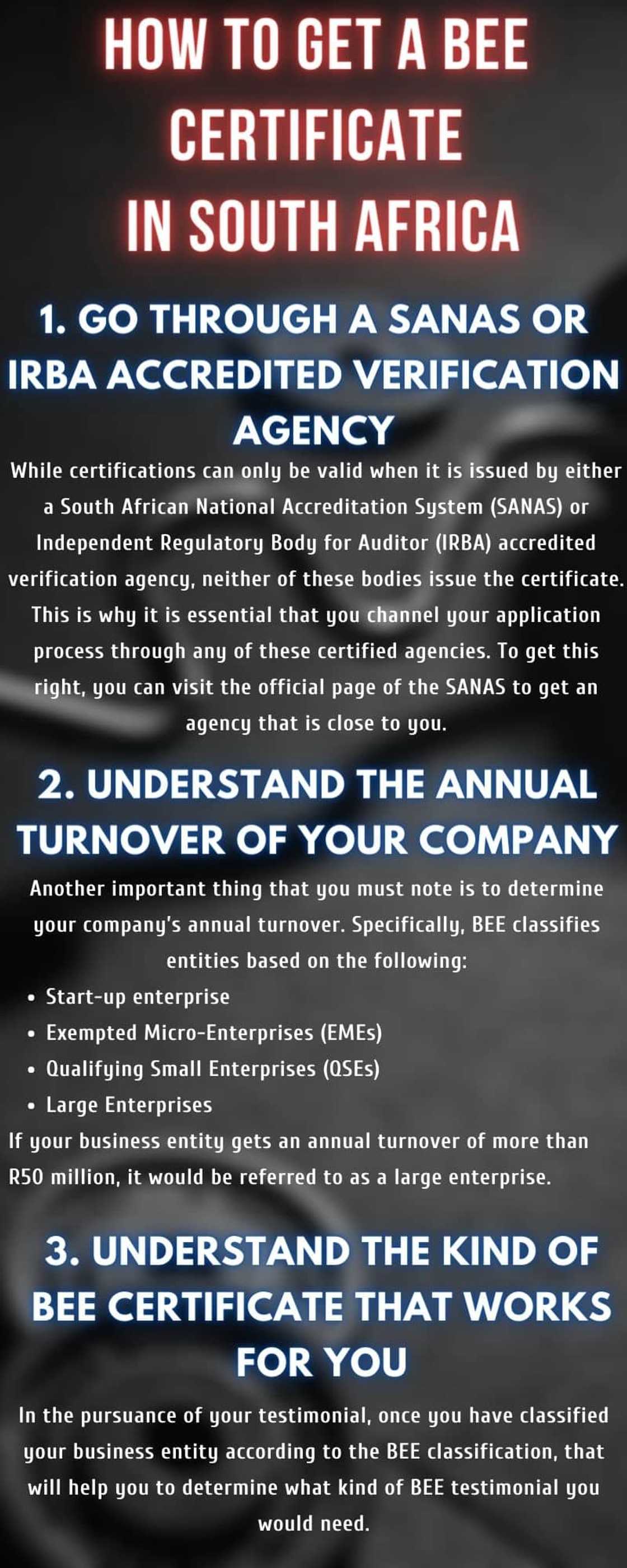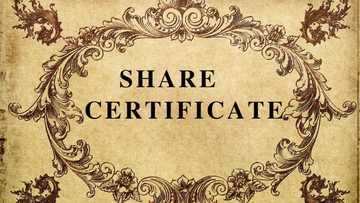BEE certificate: How to apply for or renew one in 2022?
Getting a BEE certificate is compulsory for every business owner in South Africa. Whether your company is new or not and depending on the annual turnover of your organisation, these are part of what influence the kind of certification that you need to register for. Therefore, if you need the procedural steps to take in applying for one or you need to renew your certification, this article will help you to sort things out without stress.

Source: UGC
As long as you operate a business that has an annual turnover, you are one of those who needs BEE certificate. Then, based on the BEE Act that was amended and the Codes that were revised, it is essential to keep yourself abreast on how to go about your BEE registration or renewal. As you read on this article, you will understand better the essence of the certification and how you can apply for or renew your own.
What is a BEE certificate South Africa?
A Black Economic Empowerment (BEE) certificate is a document that spells out the level at which a company complies with the BEE initiative. The certification lists various critical information including the name of a company, the address as well as the details of registration of the company assessed. Other information that are contained therein are the category of the company, sector code, element scores and points relating to the Black Economic Empowerment scorecard of the company, and the date in which the testimonial was issued.
The government of South Africa initiated this strategy in response to criticism that was raised against the nation's empowerment which was said to be narrow-based. Since no economy can thrive when some people are marginalised, what the Black Economic Empowerment does is to ensure that there is a fair distribution of wealth across all classes of people. This includes those South Africans who have been disadvantaged as far as the economy is concerned in the past.
What is the use of BEE certificate?
The certification is essential for every company to have because, among other things, it proves the level of their BEE status. Companies can also use the testimonial when they want to claim procurement which they have spent with BEE compliant suppliers. To claim this, it invariably means that such companies must buy from Black Economic Empowerment compliant suppliers so that they could score points for BEE procurement spent.

Source: UGC
When companies aim for and can attain a level one status, it helps them to remain competitive which is a plus to their companies. Other businesses, especially those who want to spend their BEE budget, can also locate them easily. Apart from that, Black Economic Empowerment certified companies can efficiently conduct business with government at all levels including municipalities, state-owned entities and government departments.
How to get a BEE certificate in South Africa
When you are applying for this testimonial, there are a few vital information that you must take note of. These are important because they help to determine what necessary steps that you have to take based on the new BEE law.
1. Go through a SANAS or IRBA accredited verification agency
While certifications can only be valid when it is issued by either a South African National Accreditation System (SANAS) or Independent Regulatory Body for Auditor (IRBA) accredited verification agency, neither of these bodies issue the certificate. This is why it is essential that you channel your application process through any of these certified agencies. To get this right, you can visit the official page of the SANAS to get an agency that is close to you.
2. Understand the annual turnover of your company
Another important thing that you must note is to determine your company’s annual turnover. Specifically, BEE classifies entities based on the following:
Start-up enterprise
If your company was formed recently or incorporated and its operation is less than one year, then you fall into this category. But note that if the enterprise is a continuation of an enterprise that had existed before, it would not be classified as a new one.
Exempted Micro-Enterprises (EMEs)
If the annual turnover of your company is less than R10 million, then it would be classified as an EME.
Qualifying Small Enterprises (QSEs)
Companies or business entities whose annual turnovers are more than R10 million but not up to R50 million are usually categorised under this option.
Large Enterprises
If your business entity gets an annual turnover of more than R50 million, it would be referred to as a large enterprise.
3. Understand the kind of BEE certificate that works for you
In the pursuance of your testimonial, once you have classified your business entity according to the BEE classification, that will help you to determine what kind of BEE testimonial you would need. For instance, if the annual turnover of your company is not up to R10 million, for your BEE Certificate, all you need to get is a free BEE Affidavit which would serve the same purpose as a testimonial. To make it valid, make sure that a Commissioner of Oaths signs it. Then, on the alternative, you can also get a CIPC certificate.
More so, if the annual turnover of your organisation is more than R10 million, this means that you will have to consult the services of any of the SANAS accredited verification agencies.

Source: UGC
How do I get a CIPC BEE certificate?
The few processes involved in getting your CIPC BEE certificate include the following:
1. Generate a customer code
On the official website of the Companies and Intellectual Property Commission (CIPC), you will click on the "Customer Registration" button. After that, you would be required to input your details including your ID/Passport Number. Once you have filled all the necessary information, your code would be generated and sent to you. However, if you have already registered with them, all you will need is your customer code and password, and you will be good to move to the next step.
2. Pay the required fee
Usually, about R30 is required to get the testimonial, and you will have to pay it into the bank account of CIPC based on the details that are available on their official page. Bear in mind that when you are paying, you must use your customer code which will serve as a reference.
3. Request for your certificate
After you have made your payment, what you will do next is to click on the "On-line transacting" button and after which you will need to sign in using your customer code as well as your password. Then, you click on "Disclosure and Certificates", and from there you would choose the type of licence that you want.
How to renew your BEE certificate
Ordinarily, a SANAS BEE certificate is only valid for one year and by implication, you would be required to renew it afterwards. The essence of renewing it is to grant the opportunity to reassess your operations including your annual turnover, how well you have improved on your Black Economic Empowerment status and also see if you qualify for a raise in your rating or not.
Therefore when you want to renew your testimonial, all you have to do is to approach any of the SANAS accredited verification agencies. You have the choice to either visit the agency that helped you out with the testimonial initially or you approach another agency. What is important to SANAS is that whatever agency you contact is accredited to do so.
While you are doing this, some of the information that would be required from you include the percentage of black ownership/shareholding, the form of business entity, the number of shareholders and so on. The authorised agency that you approach determines the kind of questions that you would be asked alongside the basic information that you have to supply.
Obtaining a BEE certificate is crucial for anyone who wishes to conduct business operations successfully in South Africa. And to obtain that, depending on the annual turnover of your organisation, you can either go for a sworn affidavit signed by a Commissioner of oath or you consult any of the SANAS accredited verification agencies. Then, while the testimonial is valid for a year, remember to renew it when necessary by visiting any of these agencies.
DISCLAIMER: This article is intended for general informational purposes only and does not address individual circumstances. It is not a substitute for professional advice or help and should not be relied on to make decisions of any kind. Any action you take upon the information presented in this article is strictly at your own risk and responsibility!
Source: Briefly News








